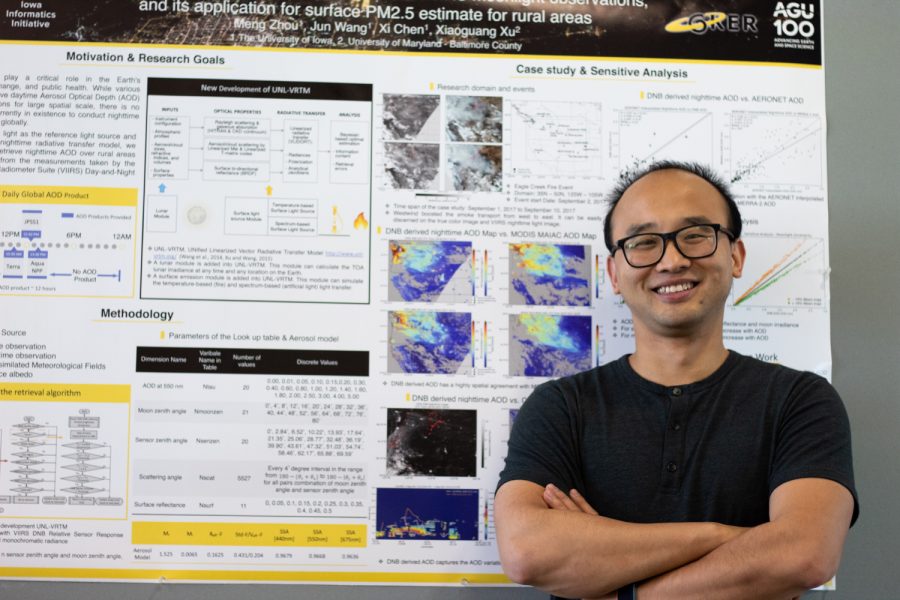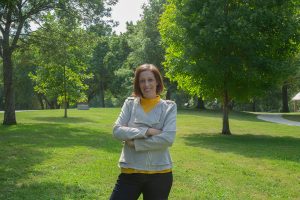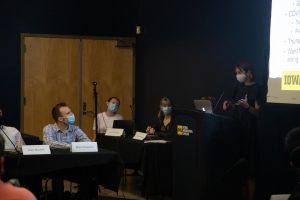NASA grants research fellowship to UI grad student to track nighttime air quality
Graduate student Meng Zhou received a research fellowship from NASA to study the concentration of nighttime aerosols.
University of Iowa graduate research assistant Meng Zhou poses in front of his research Wednesday, Sept. 15, 2021.
September 21, 2021
Aerosol particles are an important measure of air quality — but right now they can only be measured during the daytime, leaving scientists in the dark .
University of Iowa graduate student Meng Zhou has received the Future Investigators in NASA Earth and Space Science and Technology fellowship in NASA’s Earth Science Division to solve the challenge of measuring aerosol particles at night.
Zhou is a graduate student working in the Atmospheric and Environmental Research Lab.
Zhou’s research uses moonlight and satellites to measure aerosols in the atmosphere at night for the Air Quality Index.
The fellowship will last two years and provides $90,000 in total for research. The selection ratio for the award was less than 16.5 percent.
“The first part of my research is using the reflected moonlight to derive the Aerosol Optical Depth, which is a parameter that is highly correlated with the amount of particles in the atmosphere,” Zhou said.
He said active sensors used at night, such as light emitted by scientists, have a much more limited scope than passive sensors, such as naturally emitted light from the sun and moon.
Aerosol clouds are brighter than the earth’s surface, Zhou said, so sensors like sunlight and moonlight will reflect back from them more strongly. This allows scientists to retrieve the Aerosol Optical Depth in the atmosphere.
Scientists rely on daytime forecasts of aerosols much more than on nighttime forecasts, Zhou said, but his research counters that trend by conducting remote sensing at night.
He said knowing the concentration of aerosols at night will help scientists predict where the particles will travel next.
“The smoke will transport through the atmosphere and impact regional and global air qualities,” Zhou said. “If human beings are exposed to these tiny particles for a long time, there will be a lot of health issues.”
The Environmental Protection Agency has a daily standard for PM2.5 of 35 micrograms per cubic meter, Zhou said. If air quality is ranked as unhealthy, there will be financial consequences from the U.S. government, Wang said.
Zhou said the measurements can also improve climate change models.
“Other scientists might have the technologies to apply or feed the Aerosol Optical Depth into their climate model and do further research. I think this is very important for us, at least from my side, to derive this product and also do the 24-hour air quality forecast for the community,” Zhou said.
He said not knowing how PM2.5 passes at night can inhibit public officials from judging when the air is too unsafe for kids to play outdoors in some areas.
Jun Wang, UI professor of chemical and biochemical engineering and assistant director of the Iowa Technology Institute, said the research fellowship is highly prestigious. Wang is Zhou’s supervisor for the project.
“He knows this is a problem, a tough problem, and he’s not afraid to deal with tough problems,” Wang said. “No one has done this before. If it were easier people would have worked on it earlier.”
Wang said students from universities such as Princeton University and the California Institute of Technology received similar grants, and so he believes the UI is not overshadowed by big names, but is among them.
Zhou’s colleagues think highly of his work.
“My first impression of him was that he was really hard-working,” said Huanxin (Jessie) Zang, a postdoctoral research scholar in the Atmospheric and Environmental Research Lab at the Iowa Technology Institute. “You can just tell his passion, and he’s really smart.”
Wang said Zhou is already making big strides in publishing work and the project will be complete over the two-year grant period.
“He is very interested in this type of work,” Wang said. “He is able to be very persistent to maintain that interest and to maintain that hard-working spirit.”







